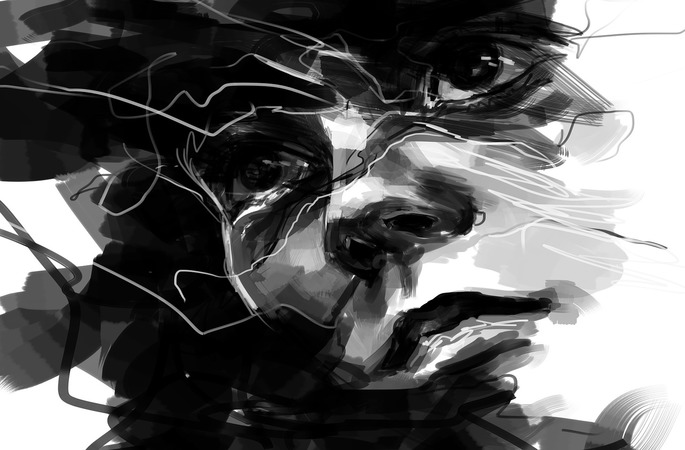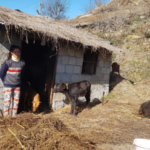I continued staring at the mirror, counting the number of flaws that composed my below-average looks: curly, unkempt hair that never quite stayed in its place; dark skin that became even worse when exposed to sunlight; pimples on the forehead probably due to excess dandruff; imperfect features of nose and lips, and semi- protruded teeth that couldn’t be fixed with braces due to that peculiar shape of jaw.
All these were enough to convince myself that I was hopeless and beyond reparation.
Sweet Sixteen was utterly bitter because of my ordeal of irreparable blemishes of the face. I became overly conscious about my face and my appearance, while secretly being jealous of those cute-faced girlfriends and their admirers.
No one ever seemed to take notice of me, let alone crushing, in fact, they might have not taken a second glance. It was as if I never existed.
I moved into my early twenties with an impending concern about my tomboyish looks and still, no one seemed to fancy me or propose like many of my contemporaries who enjoyed all the adoration and care of the boys, and I cursed my fate and blamed my parents for letting me down by begetting the not-so-good-looking features. I envied my mother who was looking beautiful in her twenties black and white photograph, and my father who was macho for his years.
I cursed their below-average manufactured product. Thus life moved on for me, cursing the chromosomes who failed to beget the good looks instead bestowing the unwanted features like those broad shoulders of my father, and the plump figure inherited from my grandparents.
I pretended that I was not in the least bothered about these material artefacts, and walked out looking bold, confident and daring, though I had scruples about the way I was.
I had secret crushes on boys for whom I was completely invisible. I constantly looked into the mirror worrying about the looks that often failed me before others. I felt low and lacked confidence, and masked my insecurities while beaming on the surface. I could never bring myself around to tell my parents – or for that matter anyone else – for fear of being ridiculed and hurting my pride. So it was my skin-deep secret, an insecurity I kept to myself and never felt a space to open it up to anyone. I felt tangled in this lone battle. On one side I listened to preachers that praised the beauty of the soul, but reality taught me just the opposite.
It wasn’t something that grew all of a sudden the moment I hit puberty. I was, back then, in school. I had always been an above-average student in my class. But then I always found myself rejected for my colour – perhaps unintentionally – by those around me. I was in grade three or four when I signed up myself for a Barbie dance for the school Annual Day. Soon the practice sessions began, and I was extremely enthused by this glorious prospect of being on the stage as the centre of attraction. Things took a divergent turn when one of the teachers felt that my dark skin looked odd among the other light-skinned Barbie dancers, and I was shown my way back to the class. The least she could have done is not to discuss that in front of a crowd that included all the young buoyant dancers including me and a few other teachers.
I went home crying, heavy-hearted, but did not dare to disclose my plight for fear of hurting my ego. I kept the drama on, and I pretended to be part of the dance team until that very day when I finally revealed that I wasn’t chosen, much to the wonder and dismay of my parents.
Even the seemingly innocent funny comments made by my fellow students those days created a conundrum in my young mind. I was dark and that meant ugly. I was doomed forever. My relatives made similar sympathetic expressions that made me stoop even further. I began to believe that I wasn’t beautiful. I even felt jealous of the golden-haired, pale-skinned dolls I played with.
My colour consciousness grew in my teenage years into its worst form. I often felt like running away at times from my school. I presumed that the world has done an injustice in creating me that way. I wondered how other dark-skinned girls and boys felt, but never had the courage to share these woes. Many had teased me for my dark skin tone, calling out names like ‘Kaka Karumbi'(Blacky), ‘Kapiri’ (Negro) in my native tongue.
My young mind was shattered but I pretended to ignore it. I have listened to preachers who say colour doesn’t matter, but I can remember teachers choosing only the fairest girl to welcome the guests with flowers and the bride of popular traditional dance art form. ‘Oppana’ was the fairest of all. Besides, every heroine in the silver screen I admired was fair and beautiful. Every hero I had secret crushes on were fair, and they had fair, beautiful, slim girlfriends.
As I started my college life, I secretly tried fairness creams in the hope of procuring fair skin, but there again I seemed to have no luck. The market was flooded with many fairness creams and I realized that I wasn’t alone and there were many like me desperate about their situation. When I was young, I remember praying to God for making me fair overnight. I‘d pray and go to bed and the next morning would peep into the mirror, but the image still showed a dark-skinned young girl, as always.
How could the light-skinned Gods understand the anguish of a dark-skinned devotee?
Weren’t there any dark-skinned Gods in a tropical country?
They are all portrayed as fair, and I wondered if there existed anything dark and beautiful?
Dark was and has always been the symbol of anything vile and evil.
However, I landed myself in an affair. I proposed and he accepted and thus begins the fairy tale. I was proud walking beside a six feet tall, fair, handsome man much to the amazement of my college mates who wondered about ‘his choice’. But it wasn’t too much later that he started hinting at my unattractive looks. Initially, it was mild suggestions and I satisfy him, using cosmetics that hardly had any impact on my obstinate skin tone. His comments soon became harsh and even rude. It became normal to hear him hurling insults and abuse at me, but I frantically tried to not lose him. It wasn’t long when I started realising that our expeditions were limited to places devoid of crowds.
He avoided malls or any such places where people thronged. Nevertheless, he introduced me to his family and friends, and so my hope was alive. But the insults sometimes became too much, and I tried to talk him out of his obsession with looks but he was not a person one could reason with. We were in his stock room, in his fancy outlet one day. In the dim light of the cosy space of the trial room, he made love and planted a parting kiss on my cheeks before stepping out. I was tired but felt blissful at the warmth and affection of my man, and I pleaded for an ice-cream. He stepped out of the shop to the crowded mall walking a step ahead of me, as if I was somebody. In the big food court, he quickly ordered an ice-cream, hardly bothering about my choice; and, in about five minutes, he not only finished his one, off but made me gulp mine and hurried me towards home. The moment I entered the private space of my room, my tears sprang out. I called him sometime later, angry and sad, demanding an explanation. ‘You could do me in the trial room, but cannot walk beside me in public’, I said.
?!” I bellowed. ‘Who would walk beside you when you are hardly good-looking?!’ The love-hate relationship moved on, and I realized I was never the kind of girl he desired and one of the reasons was my being ‘unattractive’. In my desperation, I tried to cling to him until he finally decided to break up forever.
Life moved forward. I grew up, with all those celestial imperfections. And I still looked into that mirror. Unlike before, I stood smiling and winked at my own reflection.
I was finally at peace with the mess that I was. I thought it was glorious.



